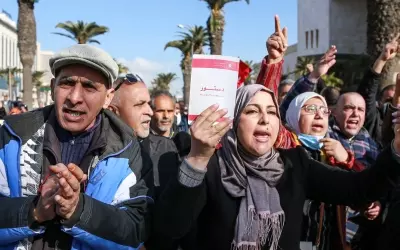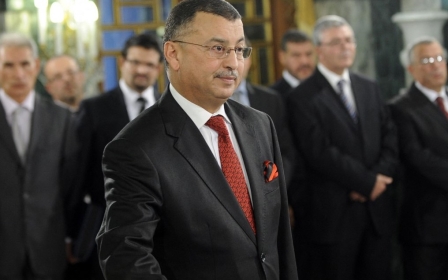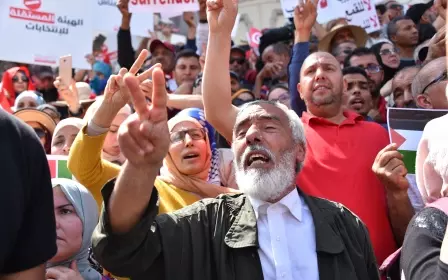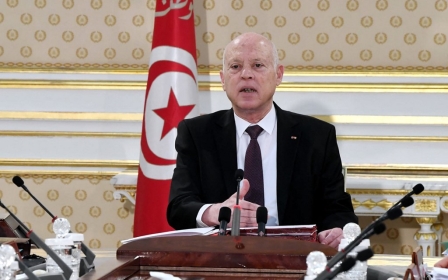'Time for action is now': US needs to reassess approach towards Tunisia, experts say
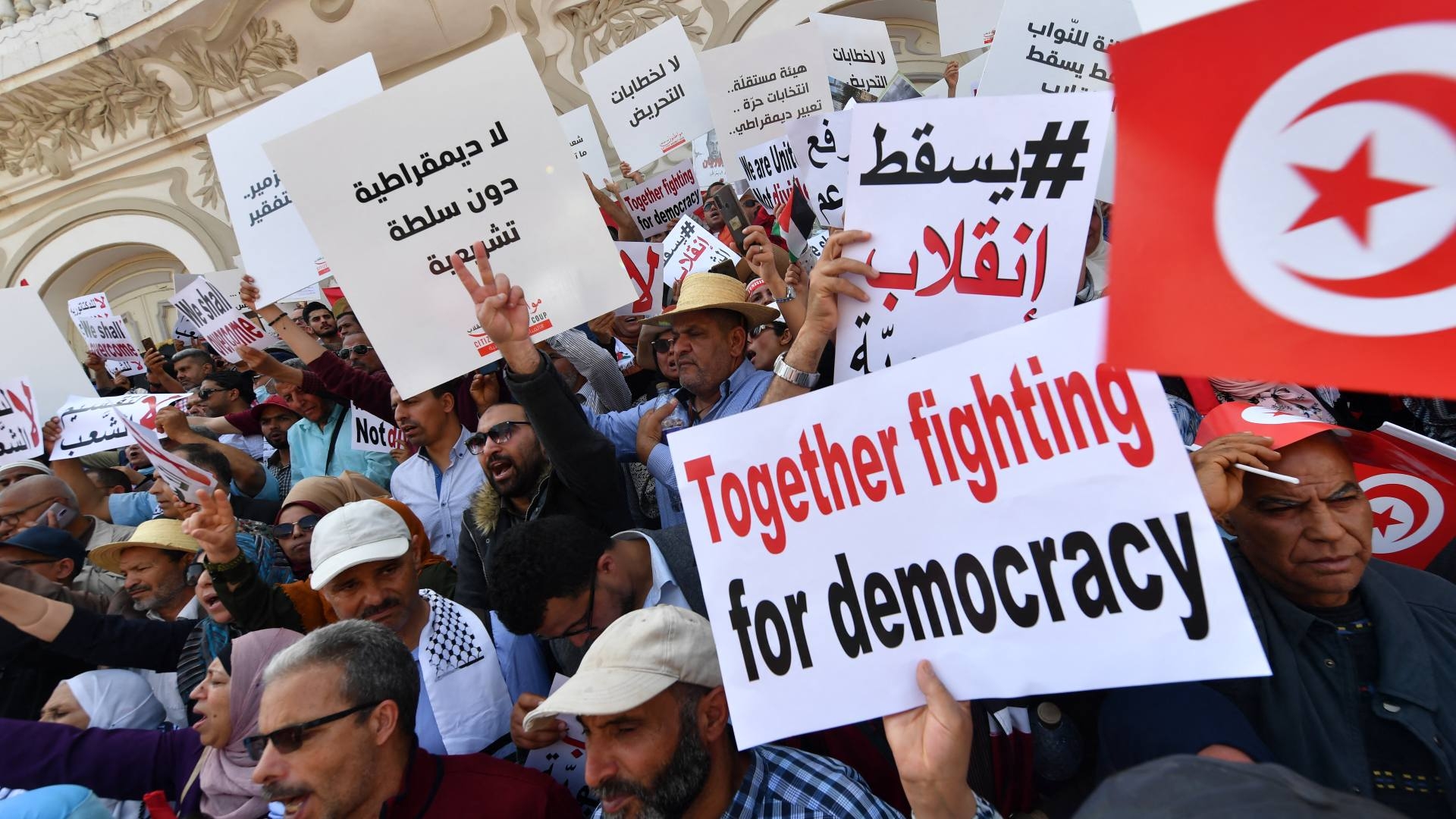
The United States risks losing the sole successful example of a post-Arab Spring democracy in the Middle East unless it increases pressure on Tunisian President Kais Saied following his July 2021 power grab, experts say.
In a virtual panel discussion hosted by the Center for the Study of Islam and Democracy on Monday, several experts said it was crucial that Washington urgently take steps to preserve democracy in the North African country, including by either suspending or conditioning US military assistance.
"The time for action is now and if we're not going to do something now, we should pretty much call it quits and expect Tunisia to move towards dictatorship, perhaps a semi-permanent level, at least for the coming years," said Shadi Hamid, a senior Middle East policy fellow at the Brookings Institution.
Saied dismissed parliament and seized control of the judiciary last summer, in a plot that was leaked to Middle East Eye two months before it was enacted.
Saied, who says his actions were both legal and necessary to save Tunisia from an "imminent threat", is rewriting the democratic constitution introduced after the 2011 Arab Spring revolution, and says he will put it to a referendum in July.
New MEE newsletter: Jerusalem Dispatch
Sign up to get the latest insights and analysis on Israel-Palestine, alongside Turkey Unpacked and other MEE newsletters
While Saied has focused on restructuring Tunisian politics, a looming economic crisis threatens to unravel his plans, as the government struggles to finance its 2022 deficit and repay debts.
Several US lawmakers have voiced alarm over the blatant power grab, with the State Department calling for democratic processes to prevail.
"It's pretty clear that persuasion is not working, and thus that it's time to reassess what to do in Tunisia," said Sharan Grewal, an assistant professor of government at the College of William & Mary, and a non-resident fellow at the Brookings Institution.
To cut, or not to cut
Tunisia is a regular recipient of US aid. Since 2011, the North African country has received nearly $685m in assistance from Washington through the United States Agency for International Development.
In April of this year, the US proposed the first partial aid suspension to Tunisia. The Biden administration's annual budget reflected a $70m cut to military aid and a $40m reduction in economic aid.
While some experts argued that a partial suspension of aid could actually sway Saied, Hamid said that nothing short of a full suspension of aid would work.
"What we know historically, particularly in the Middle East, is that partial aid cuts simply don't work."
Hamid referenced the example of when Egyptian President Abdel Fattah el-Sisi seized power in a military coup and the US issued a partial suspension of aid. The suspension was attributed to roughly less than 10 percent of the annual US assistance to Egypt, according to the Project on Middle East Democracy.
Despite the suspension of aid, Sisi continued to crack down on Egyptian civil society, imprisoning thousands of political opponents.
According to the Arabic Network for Human Rights Information, the total number of prisoners in Egypt in March 2021 was 120,000, with an estimated 65,000 political prisoners - at least 26,000 of whom were being held in pre-trial detention.
"This is always the challenge with leverage. You really have to decide to use it to the fullest extent possible. Otherwise, you're in this in-between space where you essentially alienate Kais Saied without actually getting him to change."
However, Sarah Yerkes, a senior fellow in Carnegie’s Middle East programme, asserted that suspending aid would be detrimental to restoring democracy in Tunisia, especially considering that US military aid to Tunisia, which stands roughly at $100m, is only a small portion of the country's annual military budget of more than $1bn.
"The amounts here are quite small, and cutting that assistance opens the door for Russia and the Gulf states to fill in the US void, neither of which is in the US interest or in the interest of protecting Tunisia's democracy," she said.
"Taking away that assistance right now would be counterproductive and it wouldn't actually harm Saied himself, it would harm the Tunisian people."
Instead, Yerkes said that offering incentives to Saied such as inviting him to the US's annual summit on democracy, while at the same time directing US aid to Tunisia away from the government and towards civil society groups and non-governmental organisations would be productive.
Leveraging the IMF
One option that would pose the most significant consequences for Saied and the future of Tunisia's economy would be to leverage the ongoing talks between Tunisia and the IMF.
'Tunisia within the Mena region is just absolutely critical'
- Larry Diamond, Stanford University
Tunisia is currently in a dire economic crisis. The size of the country's economy is less than 90 percent of what it was before the uprising over a decade ago, according to the IMF, while the ratio of government debt to the gross domestic product has almost doubled to around 88 percent.
Tunis has been in talks with the IMF for a new programme that would offer the cash-strapped country billions of dollars in relief.
The discussions have been delayed amid the Russian invasion of Ukraine. However, a Bloomberg report late last month said that Tunisian officials were working through finalising measures they would pledge to undertake in exchange for the loan.
"The US does have, along with its European partners, the ability to suspend IMF talks. The US and its European partners are the largest shareholders in the IMF, meaning that they can use their voting rights to compel IMF officials to suspend talks," said Hamid.
"It's just a question of whether at the highest levels of the US government they're willing to move in that direction."
Clear benchmarks
So far, the Biden administration's policy towards Tunisia since the July 2021 power grab has been described as largely tepid and ambiguous.
Experts said that any approach, whether leveraging aid, offering Saied incentives, or a combination of both, should include clear guidelines and parameters that show Tunisia is returning to a democratic path.
"We need to see clear red lines, clear benchmarks," said Yerkes.
"This can't just be 'return Tunisia to a democratic path or have an inclusive process', you need very, very clear lines so that you can see when he's met them and the Tunisian people can see when he's met them."
And with the constitutional referendum only a few months away, the US has little time to act before Saied's power grab could be set in stone for the foreseeable future.
"Tunisia within the Mena region is just absolutely critical. There are very few countries in the world, if any, that have a strategic importance for the future of democracy," said Larry Diamond, director of the Center on Democracy, Development, and the Rule of Law at Stanford University's Freeman Spogli Institute for International Studies.
Middle East Eye delivers independent and unrivalled coverage and analysis of the Middle East, North Africa and beyond. To learn more about republishing this content and the associated fees, please fill out this form. More about MEE can be found here.


